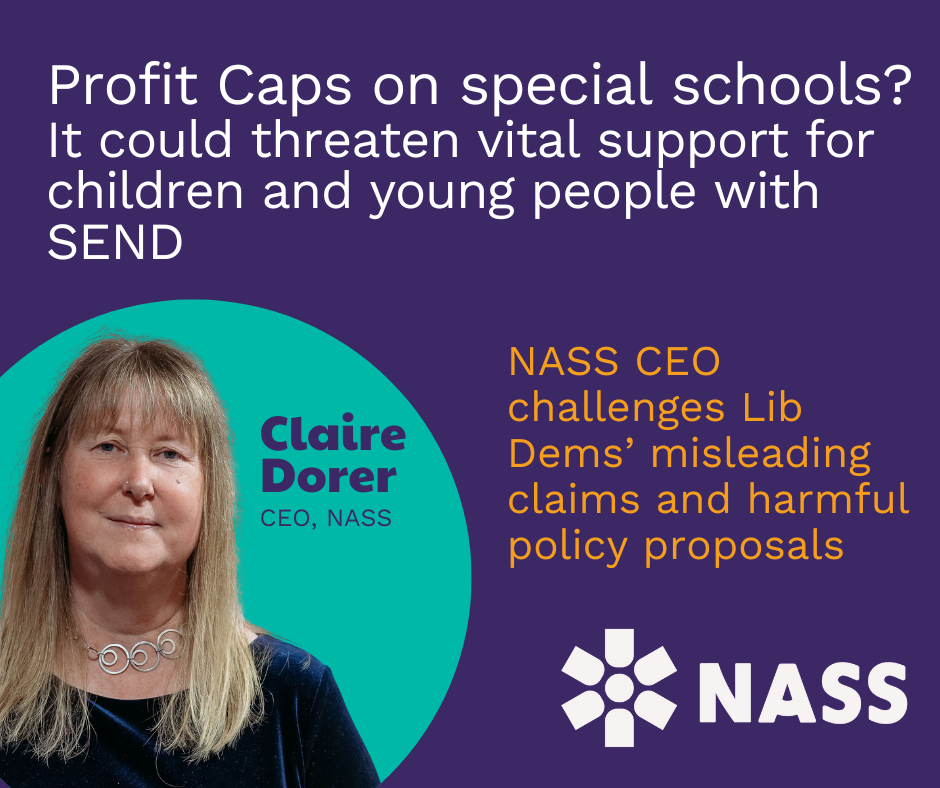
The debate around profit in children’s services is emotive and often motivated by personal morals, but policymaking must be rooted in evidence, clear definitions, and a full understanding of the system’s complexity.
The proposal made last week by the Liberal Democrats to cap profits for SEND providers raises key questions, not least - what exactly counts as “profit”? Is this all operating surplus – most of which is reinvested in the business – or are we specifically referring to the return made to investors? In what way do we conceptualise ‘profit’ in the independent sector in relation to surplus in the state or charitable sectors? Is it different and, if so, how?
The Liberal Democrats have suggested an 8% cap – a figure which appears to be drawn from last year’s Office for National Statistics (ONS) assessment of the national average operating profit for all private industries. However, this is a figure that is nearly half that of the average operating profit margin for service industries, which the ONS puts at around 15%. Without a working definition or clarity on how this would be implemented, there’s a real risk of policy being driven by headlines rather than substance. At present, the independent sector offers the only realistic opportunity to establish new SEND provision at speed – and without financial risk to the public purse for the tens of millions of pounds each new school costs. Those funds are largely coming from the reinvestment of fee income. Far from achieving its intended effect, this proposal could have serious consequences for children and young people with SEND if trusted, high-quality providers are forced to leave the sector.
Independent special schools deliver vital support for children and young people with complex SEND. These schools operate under high scrutiny, in a system marked by national shortages, rising demand and limited local authority capacity. Profit, where it exists, is primarily reinvested in staff, training, new school sites or innovation. We see this across our membership, with our annual NASS Awards showcasing some of the most innovative ways our schools improve life chances and outcomes for children and young people.
Terms like “profiteering” have become commonplace, but rarely stand up to scrutiny. Last year, the National Audit Office confirmed that rising costs in special schools are being driven by increasing demand and numbers of placements and not per student fee inflation. Independent special schools are actively investing in system capacity, recruiting highly specialised staff and providing timely, high-quality provision for those with the most complex needs. Even in the Lib Dem’s own press release, the research the LibDems are relying on simply does not back up their claims, with two of the groups showing profits of just 2%, hardly the “absolute scandal” it claims.
Cost comparisons between sectors are often misleading. Local authority provision budget data typically includes teaching only, while independent school fees must cover therapeutic, clinical, and care services, which is delivered by multidisciplinary teams working in environments with lower staff-to-pupil ratios. Higher-cost placements frequently support children in year-round residential care, where education, health, and social care must be fully integrated.
This debate must move beyond cost alone — it must focus on value and outcomes. Our 2023 research commissioned from Sonnet Impact shows that when children’s needs are met effectively, the long-term societal and economic benefits are significant. While specialist provision may be more expensive upfront, the alternative — unmet needs, escalating interventions and poorer life outcomes — carries a far greater cost.
Independent special schools are not a last resort. They are leaders in SEND practice and essential partners in a genuinely inclusive education system. Many already work closely with mainstream schools co-delivering training, offering outreach and sharing specialist expertise to support earlier intervention. NASS is proud to be an engagement partner in the Department for Education’s Inclusion in Practice initiative, and we welcomed the many member schools who contributed examples of what good inclusion looks like in action in June’s report.
Unfortunately, public debate in this area is increasingly shaped by language that is divisive and damaging. It is disappointing to see this used in the Liberal Democrat’s press release - it misrepresents the sector and risks undermining the trust of families who depend on it. The use of highly emotive and hostile terms to describe independent providers disregards the lived experiences of children and young people who have finally found a place where they feel safe, can learn and begin to thrive. It is also deeply disrespectful to the staff within them who dedicate their lives to supporting some of the most vulnerable children in the country.
The real risk with what the Liberal Democrats are proposing is that rhetoric will push providers with long-standing records of excellence out of the sector, before sufficient alternatives are in place. That will leave children and families without the support they urgently need. Making independent special schools the scapegoat for wider systemic challenges is both inaccurate and dangerous. These schools are a distinct and vital part of the SEND landscape — not a luxury, but a complement to the wider system.
NASS welcomes the opportunity to engage in a more honest, inclusive and evidence-based discussion about the future of SEND provision. That conversation must be rooted in data, be respectful of complexity and driven by the only outcome that truly matters — that every child gets the support they need, in the setting that’s right for them, at the time they need it.